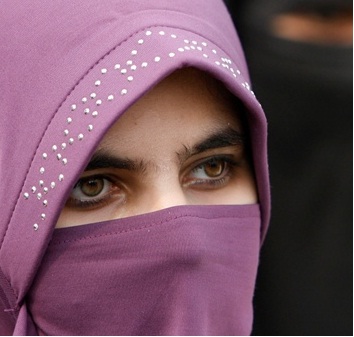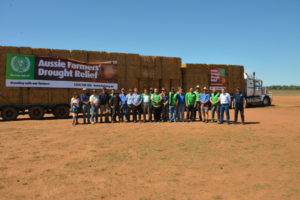
Aug 17 2010
SYDNEY – EXCLUSIVE – An Australian politician’s attempt to introduce laws to effectively ban the wearing of the Niqab looks likely to fail because of failure to win support from the public, the ruling Labor government and other political parties.
Controversial Christian Democratic Party leader Reverend Fred Nile’s so called “Burqa Bill” would see any person wearing a face covering while in a public place liable for a $550 fine, while anyone who compelled another person to wear such a covering, such as a woman’s husband, father or religious leader, could be fined $1100.
The Burqa is a full face covering worn by Muslim women mainly in Afghanistan. It is very often confused with the Niqab, a face veil with a narrow opening for the eyes.
The percentage of Australian Muslim women who wear the Niqab is unknown, but numbers are thought to be very insignificant.
The negligible number of Australian Muslim women who wear the Niqab is reflected in the example of France, official French estimates place the number at 0.1% of the Muslim population. If that figure were applied to Australia’s 400,000 Muslim community, it would equate to about 400 women or 0.002% of the entire Australian population. As for those that wear the Burqa – full-face covering – the percentage would be virtually zero.
The Bill is due to come up for debate when the NSW Parliament sits again in early September this year. However, with little public support and the Keneally Labor government clearly stating that they do not support the ban on the Niqab, all indications are the Bill will most likely not even be debated, let alone go to a vote, unless there is a reversal of this position in the near future.
Despite the current global hysteria regarding the so-called Burqa, public sentiment in Australia appears to be more pragmatic than emotional on the issue. The vast majority of Australians are against an outright ban, although there is some justified concern regarding security and identity issues that may arise as a result of covering one’s face.
This attitude is clearly evident on the homepage of the Christian Democratic Party’s website which has been running a poll posing the question; “Do you agree or disagree with Fred Nile’s Bill to ban face coverings in public (eg Burqa)?”. At the time of writing, the poll had attracted over 4400 votes and over 73% of respondents voted against the Bill. It seems that even Fred Nile’s core constituency appears not to support the ban.
At a recent briefing, hosted by the Muslim Women’s Association, the issue of the Niqab was canvassed. The attendees, most of whom were women, some who wore the Niqab – spoke out passionately about the need to ensure equal rights for all citizens regardless of race, gender or religion.
Representatives from the government Labor Party, the Greens and Family First all spoke out to indicate their respective parties will not support the proposed Bill. Although, due to short notice, the opposition Liberal Party was not represented, it is believed that they also are against the introduction of the Bill.
Helen Westwood, a Labor upper house MP representing the Government, stated unequivocally that her Party had discussed the issue and decided they would oppose the Bill. Ms Westwood stated, “Our position is that we will not support the Fred Nile Bill and will vote against it if it comes up for debate”. Without the support of the Government the Bill cannot come into law.
The Australian Greens Party’s Cate Faehrmann, who is being sworn in to the upper House in a couple of weeks to fill the Greens vacancy left by the departure of Lee Rhiannon, also indicated her Party is against the Bill and NSW Greens leader John Kaye had already strongly spoken out in Parliament against the Bill and would continue to do so.
The strongest political support however came from the Upper House MP Reverend Gordon Moyes from the Family First Party. Reverend Moyes explained he had previously been a member of the Christian Democratic Party before being proudly expelled for speaking out against what he described as the “unchristian” values of Fred Nile’s Christian Democratic Party.
The Christian Democratic Party’s policies call for a moratorium on Islamic immigration to Australia and more alarmingly call for monitoring the content of speech in Australian Mosques. Although not an official Party policy, Fred Nile as the President of the Australian Christian Association said in a speech in August 2007 entitled, “Christians must oppose the advance of Islam” called to “restrict Muslim immigration”,” restrict growth of Muslim Mosques and Schools and investigate their teaching and activities to prevent terrorism”, “close Muslim Prayer Rooms in Universities and Schools” and to “restrict Muslim headdress by prohibiting it in State Schools”.
“I don’t want people to think that just because Fred Nile and his Party describe themselves as being Christian they indeed reflect the mainstream Christian view. They don’t, because true Christianity is against such intolerance,” Rev Moyes said.
Rev Moyes then made a impassioned plea calling for Muslims, Christians and other faith groups and like minded people to come together; to politically advocate against religious intolerance, immorality and the degradation of values once common in society.
The general sentiment of the briefing indicated the Bill is nothing but another link in a decade long Islamophobic chain of events that has seen the politicization of Islam and a virtual inquisition of the identities, values and beliefs of Australian Muslims.
Politically the issue was regarded as an attempt by Fred Nile to gain publicity and build momentum for the State elections in March 2011. Nile has in the lead up to previous State elections conducted similar “dog whistle” campaigns.
The consensus amongst the Australian Muslims at the briefing was that they were generally well accepted within Australian society, but that everyone – Muslims and Non-Muslims – would benefit greatly by either the introduction of a Bill of Rights to protect the rights of all Australians or in the alternative a strengthening of the current laws in this area. As one attendee summarised, “the issue was not to protect Islam, but Muslims”.
Maha Abdo Krayem OAM from the Muslim Women’s Association said “We are not victims and reject victimhood mentality, however there are genuine concerns facing the Australian Muslim community that current laws are simply failing to address”.
The need for better understanding of the Shariah (Islamic Law) rulings on Niqab was also raised by Umm Abdur Rahman Abdullah from Daar Aisha Shariah College, Sydney. As a respected female Islamic scholar, who wears the Niqab, she commented that not only was there a need to educate Non-Muslims about the Niqab, but Muslims needed greater understanding.
“I have lived in Australia for over 40 years and have been wearing the Niqab for many years. I have not experienced any major issues in relation to the Niqab, whether it is at airports, banks, shopping centres or doing a license renewal. The Australian community at large is quite tolerant and accepting of our choice to wear the Niqab”.
“Unfortunately some Muslims do not properly understand the Islamic rulings regarding the wearing of the Niqab and this can sometimes lead to misunderstandings. For example, Shariah does take into consideration and actually requires a woman to remove her face veil in certain circumstances, for example for identification purposes in a court of law, security ID check or police identification ” said Umm Abdur Rahman.
“This just shows that Rev Nile does not understand why women wear the Niqab. Women who choose to wear it do so as a personal choice to strengthen their relationship with God. Whether it is the Hijab, Niqab or any other issue, these women act out of choice, their own free will motivated by their desire to attain nearness to God” she said.
The briefing concluded with the agreement to further engage politicians not only on the Niqab issue, but on other areas of concern to the Australian Muslim community. As well as allowing a better understanding of the specific issues, it will also hopefully provide the impetus to address the urgent need for greater legal protection against discrimination, vilification and incitement confronting the Muslim community.






